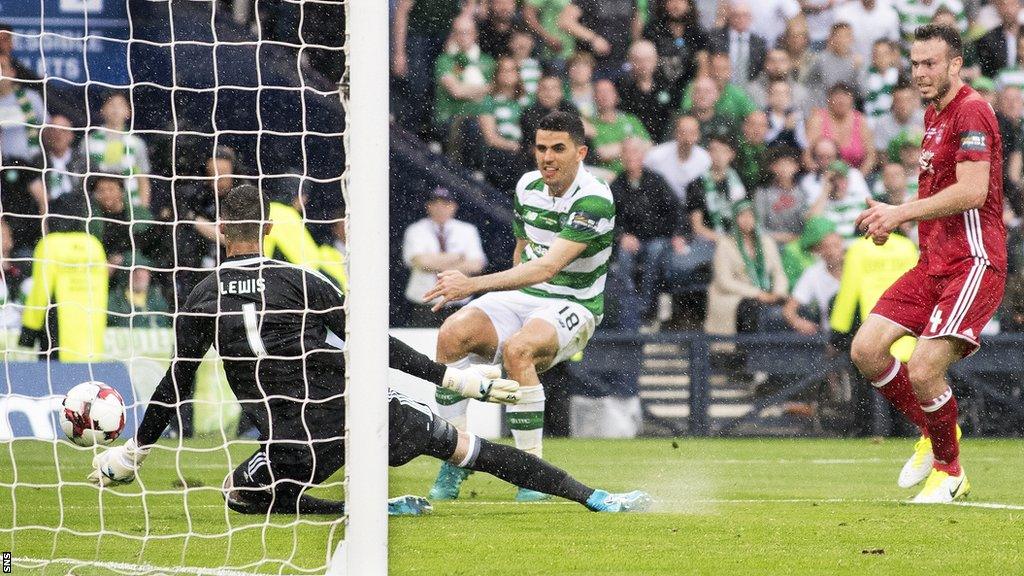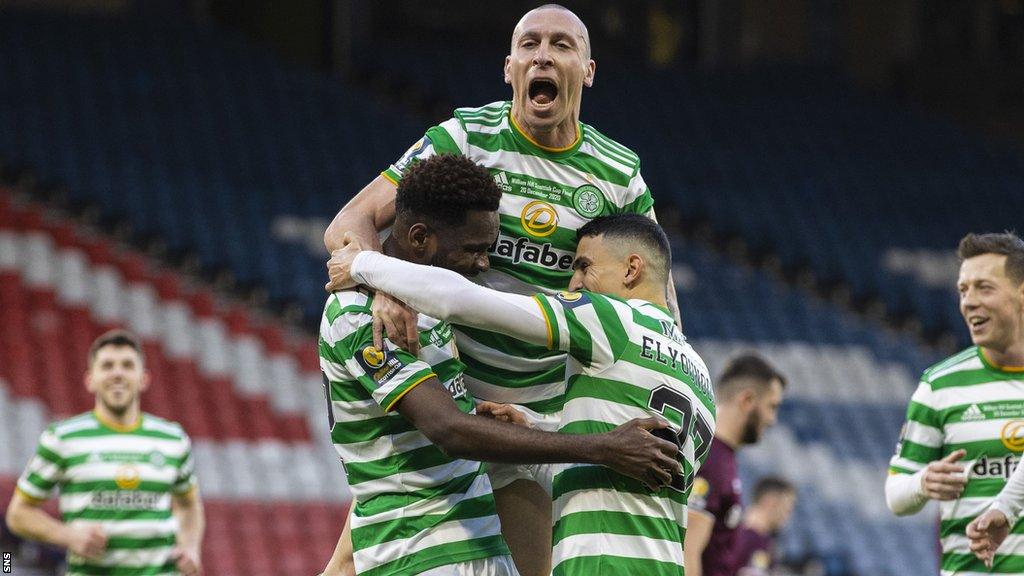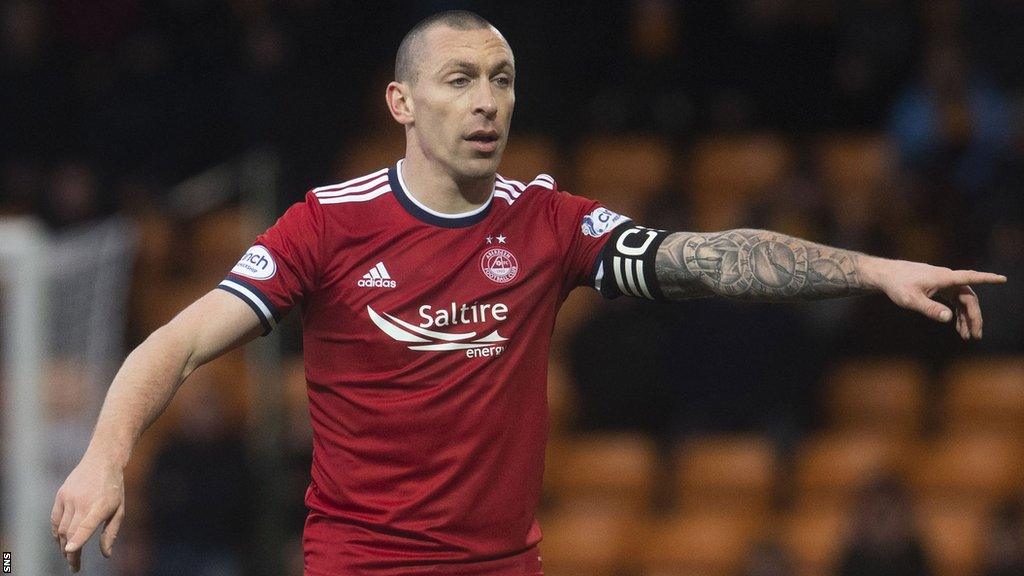Scottish Cup semi-final: Celtic v Aberdeen - Scott Brown on Tom Rogic, Brendan Rodgers, Barry Robson
- Published

Tom Rogic fires home the winner in the 2017 Scottish Cup final
Scottish Cup semi-final: Celtic v Aberdeen |
|---|
Venue: Hampden Park Date: 20 April Kick-off: 12:30 BST |
Coverage: Watch live on BBC Scotland and the BBC Sport website, listen on BBC Scotland Sportsound, or follow live text coverage on the website |
He was the leading man at Celtic for most of his 15 years in the east end of Glasgow, but Aberdeen have always had a supporting role in the career of Scott Brown.
When it comes to his favourite Celtic moment - as recounted in a special edition of the Scottish Football Podcast - the Dons feature prominently.
The 2017 Scottish Cup final at Hampden Park. The match poised on a 1-1 knife-edge between Celtic and Aberdeen as a dramatic tension-packed season finale lurched into added time.
Celtic under enormous pressure to complete an invincible season and claim the first treble of what would turn out to be a quadruple of trebles.
Somebody had to make the first one happen though, and it was Celtic's 'Wizard of Oz' who conjured up an abracadabra moment - one that Brown names as his favourite of that trophy-laden era.
"Tom [Rogic] just does what Tom does, doesn't he? He's a magician with the ball," recalls Brown.
"He's managed for some reason to go on his right foot and I'm thinking, 'he'll sclaff it, we'll get a corner'.
"Tom very rarely used that right foot, it's for standing on. His other one is an absolute wand. But at that moment, he has gone on the outside... great finish.
"It was unbelievable. I remember all of us ran down by the corner flag, jumping in with the fans. Who knows who got booked. Nobody really cared.
"To have that opportunity of winning the first treble - I had never done it before. It was unbelievable."
'Elbows going everywhere, horrible to play against'
Battles with Aberdeen stick in the mind of Brown.
During his pomp days as marauder-in-chief in the belly of the beast that was his Celtic midfield, getting one over the Dons was clearly an enjoyable experience.
Almost as enjoyable, in fact, as getting one over a former team-mate who would make the trip to Pittodrie a few years before him.
How delicious, then, to get one over both in the same game.

Brown has no regrets about leaving Celtic because he knew his body was creaking
"Barry Robson was playing, so it was me versus 'Robbo' in the middle of the park. We used to have great battles in training. Robbo had elbows going about everywhere, he was horrible to play against," he says.
"They got a corner, the ball has come in and 'Robbo' has gone to go finish it and I have slide-tackled him and sent him flying. It put a smile on my face.
"I have driven forward with the ball and given Griff [Leigh Griffiths] a terrible ball but somebody has gone down the byline, cut the ball back and I have tapped it in.
"One of the Aberdeen fans has launched a pie from the stand and I have managed to catch it, have a wee bite and thrown it back in there.
"The amount of things I did to those Aberdeen fans back in the day and for them to still actually come over and support me when I played [there] is unbelievable and shows they support their players no matter what."
'Brain speeded up as the body slowed down'
So to his spell at Aberdeen. At 36 years of age he called time on his glittering career at Celtic to pursue an opportunity as player-coach at Pittodrie under new manager Stephen Glass.
It was a move he never had any doubt about.
"There was no consideration for me - I was going," he recalls. "I was getting too old, too fragile.
"If I wanted t, I could have probably stayed [at Celtic] and held on to me being a 36-year-old - 'watch me, I can still do this at the highest level'. But I didn't want to disrespect the fans when I knew I couldn't deep down."
It would be a huge learning experience from a coaching point of view, as Brown began his evolution from player to manager. The brain was speeding up as the body was slowing down.

Brown could not bring success to Aberdeen as coach, captain and sweeper
"I was involved in everything, and then we went onto the training pitch I could help the lads out," he said.
"When we were working on shape, structure, whether it was mid-block, low-block, press - whatever we were going to do - I could help the lads.
"So the only problem was me probably! I just couldn't get about compared to what my brain wanted to do.
"I was 36, still quite fit running in straight lines, but my hip slowly started to cause problems.
"I ended up playing sweeper, which worked quite well because I am quite calm on the ball. I didn't have to run as much and I had two lads who were rapid beside me.
"We actually did play some really good games. We went to Ibrox and competed really well [2-2 draw, Brown on the scoresheet], up at Aberdeen we competed well. Even Celtic came up there and we were a little bit unlucky."
But ultimately this particular era at Pittodrie would fail to be the success either Glass or Brown hoped it would be. Why was that?
"I don't really know," he says. "It came down to small details. We would be in the game and some team would score a worldy, or there would be a mistake from somebody and it cost us.
"Football does come down to a lot of luck as well. Tom Rogic scores that goal because Aberdeen maybe don't make that pass in the final third when they probably should to go and win the game, or to take us to extra time."
So to Saturday. Will it be a case of fine margins when it comes to the Scottish Cup semi-final between Celtic and Aberdeen? Or will the chasm between the sides that the Premiership table suggests exists be replicated at Hampden?
"It is a one-off game. You never know," says Brown.
"When I played with Aberdeen we did not too bad against Celtic. But I think Brendan has got just a little bit too much squad depth wise and quality wise for Aberdeen at this moment in time."
Brown speaks fondly about his time with Aberdeen, but there is no doubt where his heart lies.
This is most evident when he recalls how his reign in Glasgow ended during the Covid era when Scotland's stadiums lay eerily silent.
"It was devastating because there was nobody there. That was the hardest thing. I never really got to say bye to the Celtic fans at the end," Brown, now Ayr United's manager, adds.
"I spent 15 years with them and we went through a lot of great times. A lot of bad times as well - but they stuck by me and I stuck by them and I think that is why we have that good bond together.
"The first thing I do after our result is I always look out for their result to make sure they have won.
"That will never change. The love for the club and all the people there, that will never change for me."

Our coverage of your Premier League club is bigger and better than ever before - follow your team and sign up for notifications in the BBC Sport app to make sure you never miss a moment
